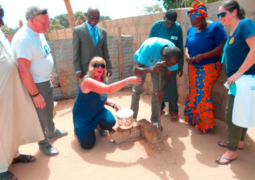The United States Ambassador to The Gambia, Barry L. Wells, is on a tour of US Embassy-supported projects in the country.
As "Seeing is believing", a popular proverb says, the tour would no doubt give the US envoy the opportunity to have first-hand information on the projects he personally endorsed for communities.
The projects, the US diplomat is visiting include the construction of pit latrines, rice milling machines, and libraries, among others, all funded under the Ambassador's Special Self-Help Programme of the US Embassy in Banjul.
By seeing the investments undertaken, Ambassador Wells would, no doubt, know that the funds given to local communities were properly utilised by the beneficiaries.
The tour also serves as an opportunity for Ambassador Wells and delegation to see and experience the real life situation in rural
The condition of people in the rural areas of the country provides rich lessons for anyone interested in human development, as familiarity with the situation on the ground would be useful to the embassy in
We understand the Ambassador's Special Self-Help (SSH) programme is a grassroots assistance programme that allows U.S embassies to respond relatively quickly to local requests from small community-based development projects.
The purpose of the Special Self-Help program, we further learnt, is to fund grants for small development activities that generate public awareness of
This is important for us in The Gambia, since we no longer have a USAID office, and consequently rural communities can benefit a lot from the SSH programmes.
Equally important is the fact that the Special Self-Help Program is structured to encourage communities to be self-reliant and undertake similar activities on their own in the future.
The programme is intended to be flexible, and allow the Ambassador to respond quickly and directly to requests from local communities for assistance with small grassroots projects that have an immediate impact and further mission policies and objectives.
All Special Self-Help projects are community-based, locally initiated, administered at the local level include a significant community contribution in cash, labor or materials.
The implementation period for individual SSH projects is usually short - less than one year. The level of funding is also small from $1000 to about $10,000.
While the SSH programme is designed to minimise paper work, there are explicit procurement, reporting and record-keeping requirements.
We, therefore, urge our communities to properly manage the projects for the purpose of sustainability.
Once again, we commend the
Read Other Articles In Article (Archive)
Sub-regional meeting on FGM underway in Banjul
Sep 23, 2011, 4:34 PM
Super Stars Promotion to hold ‘Linguerr beauty Pageant’
Jan 9, 2015, 11:38 AM



